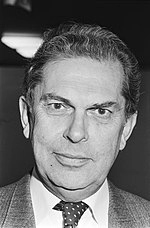How to Pronounce Barend Biesheuvel
#50
Most Popular
Boost
Apr 05, 1920 Haarlemmerliede en Spaarnwoude, North Holland, Netherlands Died on 29 Apr 2001 (aged 81)
44th Prime Minister of the Netherlands
AriesBarend Biesheuvel, Date of Birth, Place of Birth, Family, Facts, Age, Net Worth, Biography and More in FamedBorn.com

44th Prime Minister of the Netherlands
Aries